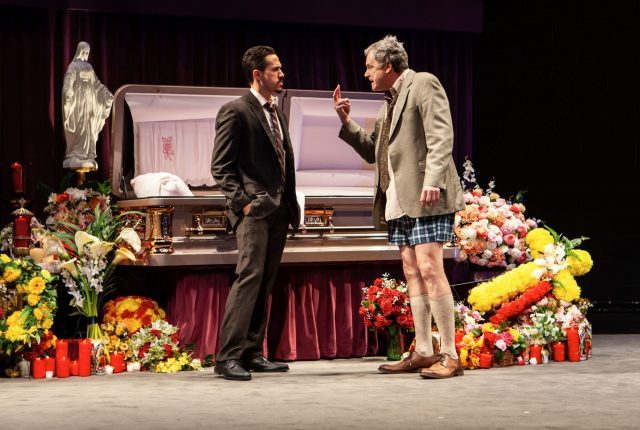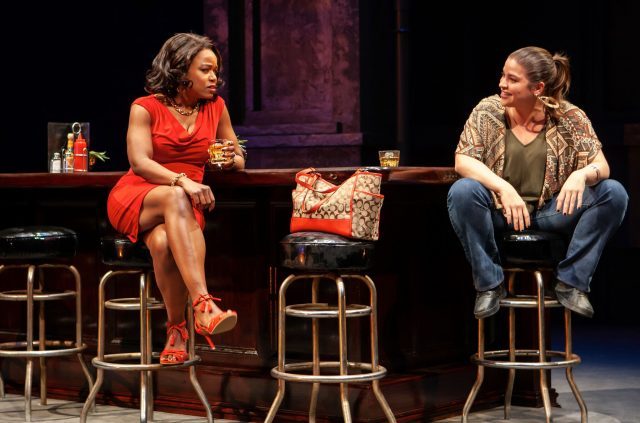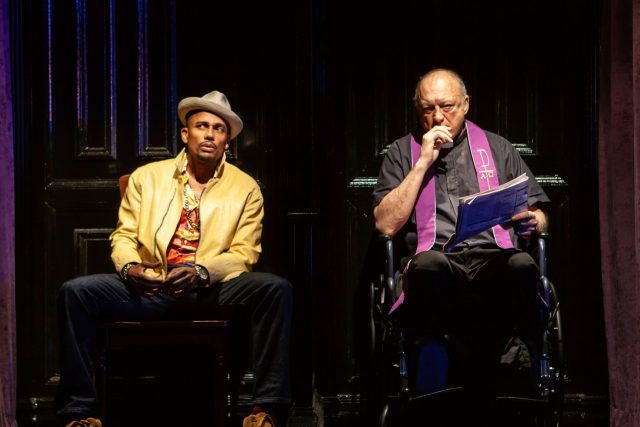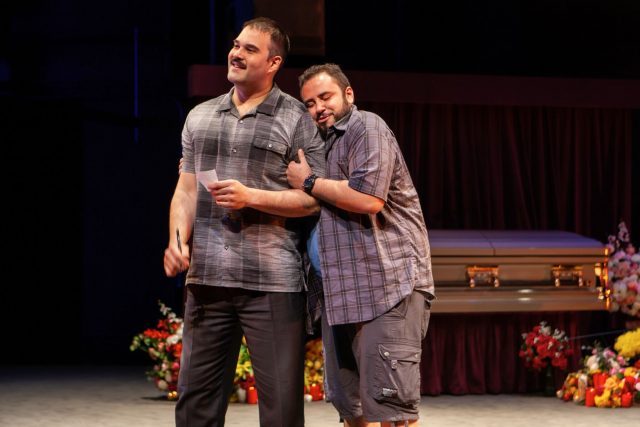
Victor (John Procaccino) and Balthazar (Joey Auzenne) wonder what’s wrong with the world in Our Lady of 121st Street (photo by Monique Carboni)
The Pershing Square Signature Center
The Irene Diamond Stage
480 West 42nd St. between Tenth & Eleventh Aves.
Tuesday – Sunday through June 10, $30
212-244-7529
www.signaturetheatre.org
The Signature Theatre follows its blistering production of Pulitzer Prize winner Stephen Adly Guirgis’s Jesus Hopped the ‘A’ Train with a wickedly funny adaptation of Guirgis’s Our Lady of 121st Street. Originally presented in 2002 at the LAByrinth Theater and directed by Philip Seymour Hoffman, the two-hour play takes place in and around the Ortiz Funeral Home in Harlem, where the body of the dearly departed, much beloved Sister Rose has gone missing. A group of her former students and various other relatives and parishioners are gathering to pay their respects to the nun, an alcoholic who tragically died in the street. Victor (John Procaccino), a middle-aged man in a pair of boxer shorts, stands over the empty coffin and cries out, “What kinda fuckin’ world is this?!” adding, “What did she ever do anyway, huh?! What did Rose ever do till the day she died but to be a fuckin’ living saint on this earth to deserve this . . . this sacrilege!” Local detective Balthazar (Joey Auzenne) affirms, “Sister Rose was a good woman.” People start filtering in, many who have not seen one another in a long time. The mourners include Rooftop (Hill Harper), a flashy, successful morning radio host; the sharp-tongued, even-sharper-dressed Inez (Quincy Tyler Bernstine), Rooftop’s ex-wife; the tough-talking Norca (Paola Lázaro), who apparently has slept around a bit and doesn’t give a shit about anyone; Flip (Jimonn Cole), now known as Robert and living with Gail (Kevin Isola), a male actor, in Wisconsin; Edwin (Erick Betancourt), who has dedicated his life to caring for his younger brother, Pinky (Maki Borden), who is slow because of a head injury; Marcia (Stephanie Kurtzuba), a relative of Sister Rose’s; and Sonia (Dierdre Friel), a friend of Marcia’s.

Inez (Quincy Tyler Bernstine) and Norca (Paola Lázaro) reconnect after some bad blood (photo by Monique Carboni)
Walt Spangler’s set features the Ortiz Funeral Home sign (an inside joke for LAByrinth cofounder John Ortiz?) above the empty coffin, a bench that also serves as a bar, and a black structure that rotates from a confessional to a small café table; Keith Parham’s effective lighting helps navigate the action, which unfolds across ten scenes in two acts that cover a little less than twenty-four hours. Over that time, Rooftop decides to confess his myriad sins to Father Lux (John Doman), Flip is desperate to hide his homosexuality from his old crew, Inez attempts to avoid Rooftop but confronts Norca, Edwin sends Pinky out for some Yodels, and Marcia takes an interest in Edwin, all while Balthazar, nipping at his small bottle of booze, tries to figure out what happened to Sister Rose’s body.

Rooftop (Hill Harper) has plenty to confess to Father Lux (John Doman) in Stephen Adly Guirgis play at the Signature (photo by Monique Carboni)
Our Lady of 121st Street is superbly directed by Phylicia Rashad (Gem of the Ocean, Immediate Family), who gives ample space to each actor to establish their character and deliver Guirgis’s incisive dialogue, which sizzles like street poetry. This is the third production of the play I’ve seen, including the 2003 version at the Union Square Theatre (starring Ortiz, David Zayas, Ron Cephas Jones, Portia, Russell G. Jones, and others), and what shines through most brightly each time is the writing itself; Guirgis, who won the Pulitzer for Between Riverside and Crazy and earned a Tony nomination for The Motherfucker with the Hat, writes with the rhythm, energy, and honesty of real people living real lives, black, white, Latinx, male, female, whatever. In the case of Our Lady, Guirgis actually had tremendous difficulty coming up with the second act and ultimately finished the play in an overnight fury after Hoffman broke down in tears, afraid that they would have to cancel the show.

Edwin (Erick Betancourt) and Pinky (Maki Borden) display a little brotherly love in Stephen Adly Guirgis’s Our Lady of 121st Street (photo by Monique Carboni)
Each of the twelve men and women in Our Lady is damaged in some way, either psychologically, emotionally, and/or physically, whether they realize it or not, as they deal with regrets that bubble up to the surface as they reflect on Sister Rose’s demise. “This is, in fact, a confessional, sir. A confessional — not a ‘conversational.’ Do you understand that distinction?” Father Lux tells Rooftop, who has a little trouble getting to the point, hesitant to own up to the specific things he has done. “Pick a commandment, any commandment,” Rooftop says, not necessarily proudly. The idea of the confessional/conversational can be applied to nearly every scene as the twelve characters, Sister Rose’s disciples, take stock of who they’ve become, perhaps remembering what they once wanted to be. The cast is exceptional, an outstanding ensemble that hits all the right notes. Born and raised on the Upper West Side, Guirgis was in Hollywood on 9/11, writing for episodic television. He decided right then that he was through writing about things that did not matter, so as soon as the show was canceled, he returned to the theater. His first play after that was Our Lady of 121st Street, a ferociously funny tale about realistic people facing tragedy in realistic ways.